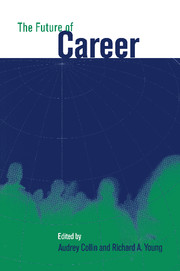Book contents
- Frontmatter
- Contents
- Notes on contributors
- Acknowledgements
- 1 Introduction: framing the future of career
- Part 1 Changing contexts
- 2 ‘Fracture lines’ in the career environment
- 3 Some contributions of sociology to the understanding of career
- 4 Renovating the psychology of careers for the twenty-first century
- 5 Changing career: the role of values
- 6 Dancing to the music of time
- Part 2 New perspectives
- Part 3 New directions for theory, practice and policy
- Author index
- Subject index
2 - ‘Fracture lines’ in the career environment
Published online by Cambridge University Press: 06 January 2010
- Frontmatter
- Contents
- Notes on contributors
- Acknowledgements
- 1 Introduction: framing the future of career
- Part 1 Changing contexts
- 2 ‘Fracture lines’ in the career environment
- 3 Some contributions of sociology to the understanding of career
- 4 Renovating the psychology of careers for the twenty-first century
- 5 Changing career: the role of values
- 6 Dancing to the music of time
- Part 2 New perspectives
- Part 3 New directions for theory, practice and policy
- Author index
- Subject index
Summary
The recent plethora of books concerned with ‘new’ interpretations of career (e.g. Arnold, 1997; Hall & Associates, 1996; Herriot & Pemberton, 1995) is indicative of a growing awareness that the concept is undergoing a fundamental, and some would say irreversible, transformation. Nor is this view restricted to academics: the demise of traditional careers forms the cornerstone of the UK Government's Lifelong Learning initiative. Expectations about jobs for life and opportunities for progression with a single employer are seen as no longer tenable in contemporary society and the vocabulary used to describe careers has changed dramatically: career, ladders, employer, job, progression, rising income, and security are ‘out’ whilst portfolio, bridges, customer, adding value, project team roles, personal growth, and maintaining employability are ‘in’ (Association of Graduate Recruiters (AGR), 1994).
The ‘environment’ of careers has largely been neglected by mainstream career theorists (Collin, 1997) but in recent years the transformation of careers has frequently been attributed to external factors: ‘we are in an era of unprecedented changes, at both global and local levels, which have the capacity to transform the nature and structure of careers’ (Jackson, Arnold, Nicholson, & Watts, 1996, p. 9). These views are echoed elsewhere (e.g. AGR, 1994; Institute of Personnel and Development (IPD), 1998) and are indicative of a growing recognition that careers cannot be considered in isolation. But what exactly are these factors and to what extent are they responsible for the radical shift in careers? Are we in danger of exaggerating the extent and inevitability of this transformation? In addressing these questions, this chapter explores the contextual factors frequently attributed to the transformation of careers and attempts to gauge the overall impact on the concept of career.
- Type
- Chapter
- Information
- The Future of Career , pp. 21 - 36Publisher: Cambridge University PressPrint publication year: 2000
- 29
- Cited by

